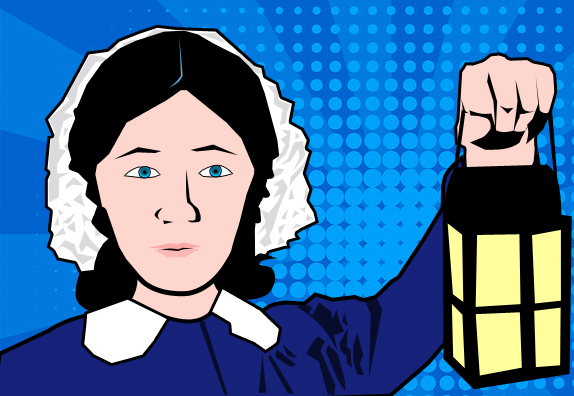Have you ever wondered why we celebrate Nurses’ Week prior to May 12th?
The reason for this is Florence Nightingale, widely considered the most famous nurse in history. Her birthday was on May 12, 1820. Ms. Nightingale was born at the Villa Colombaia, in Florence, Tuscany, Italy into a wealthy British family and was named after the city where she was born. At a young age, Ms. Nightingale experienced what she believed were calls from God. In February 1837, while visiting Embley Park, Florence Nightingale felt a strong desire to devote her life to serving others. As a young woman, she was respectful of her family’s opposition to her working as a nurse. It was in 1844 she decided to enter the field, despite her mother’s anger in her defiance against the anticipated role for a woman of her status. Florence Nightingale worked hard to educate herself in the science of nursing, and in 1847 while in Rome, she met Sidney Herbert. Mr. Herbert was a politician who had been Secretary of War (1845-1846). He and Nightingale became lifelong friends and he would be Secretary of War during the Crimean War. Herbert and his wife would be instrumental in facilitating Florence’s work in the Crimea War. Nightingale’s fame came during this war. It became her central focus when she received reports in Britain about the horrific conditions of the wounded. On October 21, 1854, she and a group of 38 women nurses, she trained, volunteered to sail to Balaklava in the Crimea, where the British camp was based.
Florence Nightingale is known as “The Lady with the Lamp,” this is due to her evening patient rounds. Ms.Nightinglage was appalled by the conditions of the soldiers in the front lines, and her work during the war helped her reform the National British Health System.
Ms. Nightingale pioneered the use of statistics in nursing and in bettering sanitary practices in healthcare. In addition to Florence’s work in public health promotion, she wrote “Notes on Nursing,” in 1859. To this day, this book is utilized as a classic introduction to the field of nursing. The Nightingale School for Nurses, which opened in 1860, is credited as the first training program for nurses. The school is now called the Florence Nightingale Faculty of Nursing and Midwifery at King’s College London.
Another Nightingale legacy is the “Nightingale Pledge.” This traditional pledge was named after her in 1893 and it is still taken by some new nurses to this day.
“I solemnly pledge myself before God and in the presence of this assembly, to pass my life in purity and to practice my profession faithfully. I will abstain from whatever is deleterious and mischievous, and will not take or knowingly administer any harmful drug. I will all in my power to maintain and elevate the standard of my profession and will hold in confidence all my personal matters committed to my keeping an all family affairs coming to my knowledge in the practice of my calling.”
Florence Nightingale’s unwavering compassion is one of the reasons she is known as the founder of modern nursing. She died peacefully on August 13, 1910.
Every year, National Nurses Week begins on May 6th and ends on May 12th, Florence Nightingale’s birthday. May 8th, 1998, was designated National Student Nurses Day These dates represent an opportunity to recognize new nurses and those who have and are working in the field.
Every year nurses play a key role in the lives of patients, families, and communities. However, this year Nurses Week has a new significance.
Nurses play an indispensable function in the lives of patients and their families, healthcare colleagues, and the community in general. This year National Nurses Week (May 6 – 12) takes on new significance as the entire healthcare community is working on the front line of Coronavirus pandemic. Nurses are putting others’ needs first as they are compassionately providing care while working under remarkable circumstances. They inspire us by performing heroic acts daily. We all owe nurses and their healthcare colleagues a heartfelt thanks with deep gratitude.
Please join Healthcare Igniter in thanking and celebrating the extraordinary nurses and other health care professionals for working so diligently and for putting others before themselves. That, after all, is the definition of a true hero.




